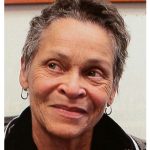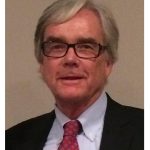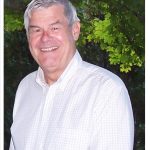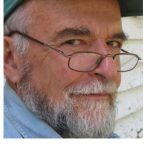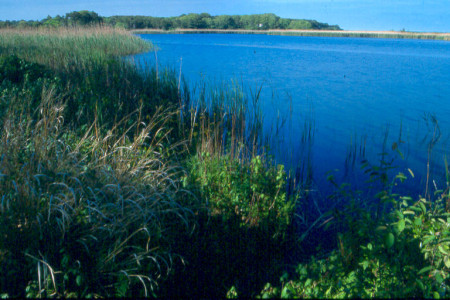Ansel B. Chaplin Award
2002
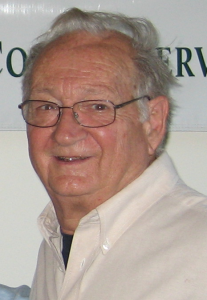 Ansel B. Chaplin conceived the idea of The Compact in 1986 and served as its President for 15 years. While maintaining a law practice in Boston and Truro, Ansel also joined in the founding of the Truro Conservation Trust in 1980 with Dr. Charles Davidson and served as its Administrative Trustee for 24 years. Ansel guided the first conservation land acquisitions by the Town of Truro in the mid-1980s, including the $3 million purchase of land at High Head, assembling state and federal grants and private donations, so there was no cost to the Town. He led the effort to create and grow The Compact’s revolving loan fund, now capitalized at more than $600,000. Ansel’s wisdom and experience guided the Truro Planning Board. His roots on Cape Cod go back to the first settlers. He enjoyed canoeing in his beloved Pamet River before his death in 2017.
Ansel B. Chaplin conceived the idea of The Compact in 1986 and served as its President for 15 years. While maintaining a law practice in Boston and Truro, Ansel also joined in the founding of the Truro Conservation Trust in 1980 with Dr. Charles Davidson and served as its Administrative Trustee for 24 years. Ansel guided the first conservation land acquisitions by the Town of Truro in the mid-1980s, including the $3 million purchase of land at High Head, assembling state and federal grants and private donations, so there was no cost to the Town. He led the effort to create and grow The Compact’s revolving loan fund, now capitalized at more than $600,000. Ansel’s wisdom and experience guided the Truro Planning Board. His roots on Cape Cod go back to the first settlers. He enjoyed canoeing in his beloved Pamet River before his death in 2017.
2003
 D. Isabel Smith was the beloved Mother of Open Space in Harwich for 20 years before she died in 2006. Recently retired to Harwich from Dorchester in the 1980s, she rallied first her neighborhood and then the townspeople to preserve land at Oliver’s Pond. She caught the land conservation bug and helped to found the Harwich Conservation Trust in 1988 and served as its Vice-President for many years. When the Cape Cod Land Bank was approved in 1998, Isabel began negotiating deals for the Town of Harwich as Chair of the Real Estate and Open Space Committee. Under her leadership, Harwich completed 17 acquisitions preserving 338 acres worth more than $15 million. She coordinated the complex 42-acre Monomoy River Woodlands purchase, which was dedicated in her honor. Isabel was a long-serving delegate to The Compact, including a stint as its Vice-President. Her warmth was enjoyed by every person she met.
D. Isabel Smith was the beloved Mother of Open Space in Harwich for 20 years before she died in 2006. Recently retired to Harwich from Dorchester in the 1980s, she rallied first her neighborhood and then the townspeople to preserve land at Oliver’s Pond. She caught the land conservation bug and helped to found the Harwich Conservation Trust in 1988 and served as its Vice-President for many years. When the Cape Cod Land Bank was approved in 1998, Isabel began negotiating deals for the Town of Harwich as Chair of the Real Estate and Open Space Committee. Under her leadership, Harwich completed 17 acquisitions preserving 338 acres worth more than $15 million. She coordinated the complex 42-acre Monomoy River Woodlands purchase, which was dedicated in her honor. Isabel was a long-serving delegate to The Compact, including a stint as its Vice-President. Her warmth was enjoyed by every person she met.
2004
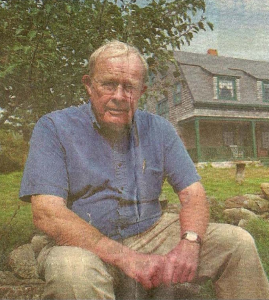 Charles H. Thomsen began his conservation career in the early 1960s when he helped to coordinate a conservation restriction on his family’s Pochet Island in Pleasant Bay with the Cape Cod National Seashore. He joined the board of the Orleans Conservation Trust 20 years later and then served as its President for almost another 20 years. Charlie’s interest in shellfish, marine water quality and historic preservation led to leadership positions on town boards and societies associated with those issues, including the Friends of Pleasant Bay and Orleans Historical Society. As a Realtor, Charlie was one of the brave few who spoke out in favor of the Cape Cod Land Bank proposal. As a Korean War veteran, he testified in favor of converting the Mass. Military Reservation into a wildlife refuge and water supply reserve. Charlie served as a founder of The Compact and its Treasurer for many years. The Compact’s Land Fund is named in his honor. He was a very generous man, with his time and talents and good humor. He died in 2006.
Charles H. Thomsen began his conservation career in the early 1960s when he helped to coordinate a conservation restriction on his family’s Pochet Island in Pleasant Bay with the Cape Cod National Seashore. He joined the board of the Orleans Conservation Trust 20 years later and then served as its President for almost another 20 years. Charlie’s interest in shellfish, marine water quality and historic preservation led to leadership positions on town boards and societies associated with those issues, including the Friends of Pleasant Bay and Orleans Historical Society. As a Realtor, Charlie was one of the brave few who spoke out in favor of the Cape Cod Land Bank proposal. As a Korean War veteran, he testified in favor of converting the Mass. Military Reservation into a wildlife refuge and water supply reserve. Charlie served as a founder of The Compact and its Treasurer for many years. The Compact’s Land Fund is named in his honor. He was a very generous man, with his time and talents and good humor. He died in 2006.
2005
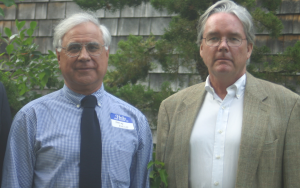 Henry Kelley II (left) received the Chaplin Award from Richard Johnston, President of The Compact. Mr. Kelley was honored for his conservation efforts over the past 30 years in the Town of Dennis, including his chairmanship of the Dennis Land Bank since 1999, which resulted in more successful open space deals (28) than almost any other Cape Cod town. Henry was instrumental in guiding the grass-roots campaign to get Cape Cod voters to accept the Land Bank in 1998. His 1970s fiscal impact analysis of how open space helps a town treasury is still cited by admirers. “The work of land conservation is never done!” he says.
Henry Kelley II (left) received the Chaplin Award from Richard Johnston, President of The Compact. Mr. Kelley was honored for his conservation efforts over the past 30 years in the Town of Dennis, including his chairmanship of the Dennis Land Bank since 1999, which resulted in more successful open space deals (28) than almost any other Cape Cod town. Henry was instrumental in guiding the grass-roots campaign to get Cape Cod voters to accept the Land Bank in 1998. His 1970s fiscal impact analysis of how open space helps a town treasury is still cited by admirers. “The work of land conservation is never done!” he says.
2006
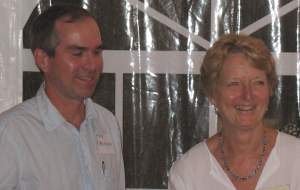 Susanne Goodman Hallstein (right, with Mark Robinson) taught in the Falmouth Public Schools for 27 years. Somehow she also found the time to serve as President of The 300 Committee, Falmouth’s land trust, from 1999 to 2005, during which time she led the effort of the Town to purchase and preserve 900 acres. Ms. Goodman Hallstein also led the land trust’s campaign to raise $7.5 million in private funds for open space from 2002-2004. In presenting her with the Chaplin Award, Compact Executive Director Mark Robinson (left) said how impressed he has been with Susie’s ability to deal with a large board and town officials with such graceful command.
Susanne Goodman Hallstein (right, with Mark Robinson) taught in the Falmouth Public Schools for 27 years. Somehow she also found the time to serve as President of The 300 Committee, Falmouth’s land trust, from 1999 to 2005, during which time she led the effort of the Town to purchase and preserve 900 acres. Ms. Goodman Hallstein also led the land trust’s campaign to raise $7.5 million in private funds for open space from 2002-2004. In presenting her with the Chaplin Award, Compact Executive Director Mark Robinson (left) said how impressed he has been with Susie’s ability to deal with a large board and town officials with such graceful command.
2007
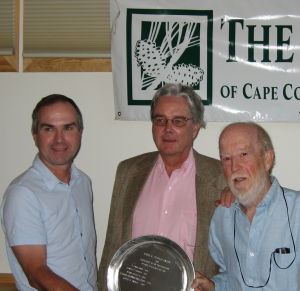 Robert G. Hankey (right) was an early trustee of the Wellfleet Conservation Trust in 1984 and served until his death in 2012, including long stints as President. He was an early and enthusiastic advocate for the idea of the regional Compact and helped to raise funds for our revolving loan fund. Retired from the US Foreign Service, Mr. Hankey has been active on the zoning board and charter review committees in Wellfleet town hall. Under Robert’s leadership, the land trust in Wellfleet has preserved more than 300 acres and secured the state designation of the Wellfleet Harbor as an Area of Critical Environmental Concern. Many landowners know Robert as the “friendly pest,” asking them when they are going to preserve their land; often, they give in and give it! (l to r: Robinson, Johnston, Hankey)
Robert G. Hankey (right) was an early trustee of the Wellfleet Conservation Trust in 1984 and served until his death in 2012, including long stints as President. He was an early and enthusiastic advocate for the idea of the regional Compact and helped to raise funds for our revolving loan fund. Retired from the US Foreign Service, Mr. Hankey has been active on the zoning board and charter review committees in Wellfleet town hall. Under Robert’s leadership, the land trust in Wellfleet has preserved more than 300 acres and secured the state designation of the Wellfleet Harbor as an Area of Critical Environmental Concern. Many landowners know Robert as the “friendly pest,” asking them when they are going to preserve their land; often, they give in and give it! (l to r: Robinson, Johnston, Hankey)
2008
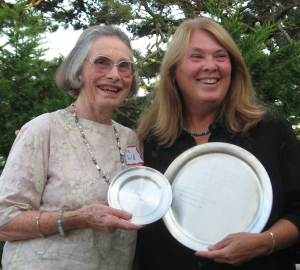 Anne G. Gould was a founding trustee of the Mary Barton Land Conservation Trust in 1980. She immediately set to work in raising $150,000 to preserve 105 upland acres around the perimeter of Eagle Pond in Cotuit. Almost 30 years later, she was still at it, helping to raise $3.3 million to preserve an adjoining 22 acres. In presenting the Chaplin Award to Anne, Compact Vice President Jaci Barton (no relation to Mary Barton) described Anne’s determined mantra in saving land: “Failure is not an option!” Anne also served long terms as a board member of the Barnstable Land Trust, and led the group as president. She has donated land to the Barnstable Land Trust and serves as the honorary Godmother of Open Space in Cotuit.
Anne G. Gould was a founding trustee of the Mary Barton Land Conservation Trust in 1980. She immediately set to work in raising $150,000 to preserve 105 upland acres around the perimeter of Eagle Pond in Cotuit. Almost 30 years later, she was still at it, helping to raise $3.3 million to preserve an adjoining 22 acres. In presenting the Chaplin Award to Anne, Compact Vice President Jaci Barton (no relation to Mary Barton) described Anne’s determined mantra in saving land: “Failure is not an option!” Anne also served long terms as a board member of the Barnstable Land Trust, and led the group as president. She has donated land to the Barnstable Land Trust and serves as the honorary Godmother of Open Space in Cotuit.
(l to r: Anne Gould, Compact VP Jaci Barton)
2009
 Henry Lind spent summers in Eastham all of his life. In 1976 he became that Town’s first natural resource officer, promoting shellfisheries and herring runs, serving as harbormaster, responding to marine mammal strandings and implementing wetlands protection bylaws. Henry has led the charge at Town Meetings to get the Town to buy more than 500 acres of open space through the time of his retirement in 2009. He has served as President of the Eastham Conservation Foundation, Inc. almost since its inception in 1978. That local land trust has completed 55 transactions preserving another 280 acres, in a community where there has been little land left to preserve between dense development and the Cape Cod National Seashore’s presence. “Henry succeeds because he is just as good with people as he is with land and water,” says Robinson.
Henry Lind spent summers in Eastham all of his life. In 1976 he became that Town’s first natural resource officer, promoting shellfisheries and herring runs, serving as harbormaster, responding to marine mammal strandings and implementing wetlands protection bylaws. Henry has led the charge at Town Meetings to get the Town to buy more than 500 acres of open space through the time of his retirement in 2009. He has served as President of the Eastham Conservation Foundation, Inc. almost since its inception in 1978. That local land trust has completed 55 transactions preserving another 280 acres, in a community where there has been little land left to preserve between dense development and the Cape Cod National Seashore’s presence. “Henry succeeds because he is just as good with people as he is with land and water,” says Robinson.
2010
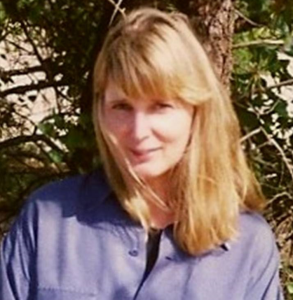 Celine F. Gandolfo served as the leading open space advocate in Provincetown for more than a decade. As former Chair of the Land Bank Committee and now President of the Provincetown Conservation Trust, she has guided all of the major town open space purchases, including Shankpainter Pond, Nicky’s Park, Foss Woods and Whistle Path Woods. “My philosophy is that when an important habitat is threatened by development, we at least have to try, try to save it. Her friend and State Rep. Sarah Peake says, “Celine has had the vision of creating the protected Greenway of open space stretching from the Truro line to Herring Cove. She realized this vision through her tenacity, hard work, by sharing her knowledge and enthusiasm for her vision with the townspeople. She never takes her eye off the ball. It is so important to me to listen to local experts like Celine.”
Celine F. Gandolfo served as the leading open space advocate in Provincetown for more than a decade. As former Chair of the Land Bank Committee and now President of the Provincetown Conservation Trust, she has guided all of the major town open space purchases, including Shankpainter Pond, Nicky’s Park, Foss Woods and Whistle Path Woods. “My philosophy is that when an important habitat is threatened by development, we at least have to try, try to save it. Her friend and State Rep. Sarah Peake says, “Celine has had the vision of creating the protected Greenway of open space stretching from the Truro line to Herring Cove. She realized this vision through her tenacity, hard work, by sharing her knowledge and enthusiasm for her vision with the townspeople. She never takes her eye off the ball. It is so important to me to listen to local experts like Celine.”
2011
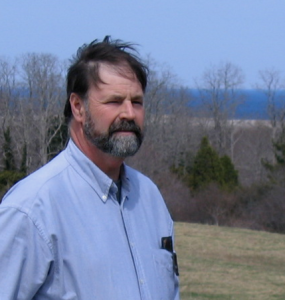 John Nye Cullity was the founder of the Sandwich Conservation Trust in 1985 and has served as its president since that time. John quips, “I think it is the only land trust founded by a housepainter.” Not only has the Trust preserved more than 220 acres under his leadership, but the Town has acquired more than 800 acres of open space at John’s urging. His family has preserved the historic Round Hill Farm with a conservation restriction. The preserved miles-long network of hiking trails along Sandwich’s morainal ridge is John’s doing. He is seen as an inspiration to many in town who are concerned equally about its habitats and heritage. He is described variously as humble, passionate, determined, honorable, unassuming, earnest and unfailingly positive. One admirer says, “John is simply doing his best, preferring to work behind the scenes, to protect and preserve the place he loves.”
John Nye Cullity was the founder of the Sandwich Conservation Trust in 1985 and has served as its president since that time. John quips, “I think it is the only land trust founded by a housepainter.” Not only has the Trust preserved more than 220 acres under his leadership, but the Town has acquired more than 800 acres of open space at John’s urging. His family has preserved the historic Round Hill Farm with a conservation restriction. The preserved miles-long network of hiking trails along Sandwich’s morainal ridge is John’s doing. He is seen as an inspiration to many in town who are concerned equally about its habitats and heritage. He is described variously as humble, passionate, determined, honorable, unassuming, earnest and unfailingly positive. One admirer says, “John is simply doing his best, preferring to work behind the scenes, to protect and preserve the place he loves.”
2012
 Andrew P. Young has been the go-to guy for open space in Chatham for the past 30 years. Andy served on the Town Conservation Commission and as Selectmen, negotiating important town land purchases. When Andy took over as President of the Chatham Conservation Foundation (CCF) in 1999, he served as a real bridge between the founders that had run the land trust for 30 years and the modern CCF that exists now. For five years as President, he worked to broaden the CCF board and he reached out to create important alliances with the Town Hall and regional organizations. Andy takes his volunteer responsibilities seriously and does his homework. He is knowledgeable, dedicated, and hard-working. His leadership is characterized by intelligence, reason and respect.
Andrew P. Young has been the go-to guy for open space in Chatham for the past 30 years. Andy served on the Town Conservation Commission and as Selectmen, negotiating important town land purchases. When Andy took over as President of the Chatham Conservation Foundation (CCF) in 1999, he served as a real bridge between the founders that had run the land trust for 30 years and the modern CCF that exists now. For five years as President, he worked to broaden the CCF board and he reached out to create important alliances with the Town Hall and regional organizations. Andy takes his volunteer responsibilities seriously and does his homework. He is knowledgeable, dedicated, and hard-working. His leadership is characterized by intelligence, reason and respect.
2013
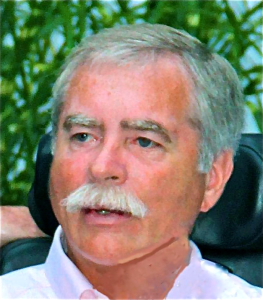 Robert F. Smith founded the Harwich Conservation Trust 25 years ago in 1988, the most recent land trust on the Cape. A born and bred Cape Codder, Bob has diligently served as the only President the HCT has known, somehow managing to fit in a busy law practice on the side. The HCT has thrived owing to the team chemistry that Bob envisioned long ago and he continues to inspire that still. He creates a team of professionals and volunteers that know how to achieve goals with excellence in outcome and kindness in process. The HCT has preserved more than 450 acres since its founding, been supported by 900 members and donors, has instituted the best educational series of walks and talks on the environment, recruited dozens of passionate land steward volunteers, established a visible headquarters staffed with well-trained professionals and established itself as a force for conservation in the community.
Robert F. Smith founded the Harwich Conservation Trust 25 years ago in 1988, the most recent land trust on the Cape. A born and bred Cape Codder, Bob has diligently served as the only President the HCT has known, somehow managing to fit in a busy law practice on the side. The HCT has thrived owing to the team chemistry that Bob envisioned long ago and he continues to inspire that still. He creates a team of professionals and volunteers that know how to achieve goals with excellence in outcome and kindness in process. The HCT has preserved more than 450 acres since its founding, been supported by 900 members and donors, has instituted the best educational series of walks and talks on the environment, recruited dozens of passionate land steward volunteers, established a visible headquarters staffed with well-trained professionals and established itself as a force for conservation in the community.
2014
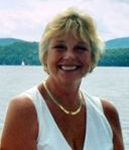 Barbara U. Birdsey grew up in Centerville where she developed her passion for nature and wildlife. An icon of the Cape’s wild care community, Barbara understands that individual animals cannot be saved unless there is habitat set aside and protected for them to live in. She has given “work, wisdom, and wealth” to ensure both. She founded the Orenda Wildlife Land Trust in 1986 to create sanctuaries; Orenda now protects 444 acres throughout Massachusetts. She brought the US Humane Society to the Cape to establish the Cape Wildlife Center, which admits 2000 animals each year for treatment. She has worked on animal protection in Florida, the Southwest, and through the Caribbean. Often described as “hands-on” or “down to earth”, Barbara is known for being willing to do the dirty work of animal care. When poisoned gulls from the wildlife refuge in Chatham were dropping out of the sky, Barbara was there helping to end the suffering of individual birds. When Barbara sees a need in the environmental community, she says, “How can we help?”
Barbara U. Birdsey grew up in Centerville where she developed her passion for nature and wildlife. An icon of the Cape’s wild care community, Barbara understands that individual animals cannot be saved unless there is habitat set aside and protected for them to live in. She has given “work, wisdom, and wealth” to ensure both. She founded the Orenda Wildlife Land Trust in 1986 to create sanctuaries; Orenda now protects 444 acres throughout Massachusetts. She brought the US Humane Society to the Cape to establish the Cape Wildlife Center, which admits 2000 animals each year for treatment. She has worked on animal protection in Florida, the Southwest, and through the Caribbean. Often described as “hands-on” or “down to earth”, Barbara is known for being willing to do the dirty work of animal care. When poisoned gulls from the wildlife refuge in Chatham were dropping out of the sky, Barbara was there helping to end the suffering of individual birds. When Barbara sees a need in the environmental community, she says, “How can we help?”
2015
Richard A. Johnston is a long-time Dennis resident who helped to found the Dennis Conservation Trust in 1986. He served as DCT President for almost 20 years and President of The Com-pact from 2000-2015. Rich’s other legacy as one of Boston’s top lawyers (at Hale&Dorr, then WilmerHale) led him this year to become Chief Counsel to the Mass. Attorney General. The DCT grew to preserve more than 550 acres under Rich’s tenure, including the Town-Trust-State partnership that preserved the bulk of Crowes Pasture as Dennis’ flagship conservation proper-ty. Rich brought the same vision, leadership and collaborative approach through The Compact to other towns. Rich often says that the Cape’s local land trusts should not let any remaining natural acre go begging for want of action to preserve it. Despite a laid-back manner, Rich is tenacious in wanting to see the best of the Cape’s land preserved for all to enjoy, for all time.
2016
Peter Johnson is the Happy Warrior for open space preservation on the Cape (and before that in his native Connecticut River Valley). As past President of the Brewster Conservation Trust, he energized the land acquisition program like never before and recruited dozens of volunteer stewards for land management tasks. Landowners have a hard time saying no to Peter with his friendly, low-key approach; his mantra is “It never hurts to talk about conservation options.” Peter believes in activating local politics for open space and environmental protection and he has helped the Town of Brewster to be a leader on the Cape on these issues. He volunteers with the Cape Cod Museum of Natural History and the Town Community Preservation Committee. He and his wife Eleanor donated a conservation restriction on prime waterfront land on Pleasant Bay. Peter bleeds green.
2017
R. Dennis O’Connell is a life-long Wellfleet devotee. He has traveled worldwide as a financial executive and business consultant, but Wellfleet is his safe 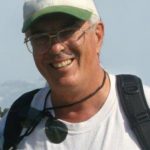 harbor. The late Robert Hankey had sought out Denny’s father, hoping he might agree to serve on the board of the Wellfleet Conservation Trust. Denny’s dad said no, but you should recruit my son! It was a good call, Denny has served on the WCT board since 1999 and as its president since 2004. In that time, he has provided vision and determination to round up major new parcels for conservation. One of his favorites is the Head of Duck Creek, where a dilapidated house was removed and the land restored as nesting habitat for the rare diamondback terrapin, within sight of downtown. Under Denny’s leadership, WCT has attracted multiple State grants for open space purchases and he has made partnerships with the Town a standard operating procedure. Denny is known for his “love of the land” in his hometown and has served faithfully on the Planning Board and other local committees. He likes mentoring young AmeriCorps members who have helped WCT in recent years. As one admirer says, “He inspires us all!”
harbor. The late Robert Hankey had sought out Denny’s father, hoping he might agree to serve on the board of the Wellfleet Conservation Trust. Denny’s dad said no, but you should recruit my son! It was a good call, Denny has served on the WCT board since 1999 and as its president since 2004. In that time, he has provided vision and determination to round up major new parcels for conservation. One of his favorites is the Head of Duck Creek, where a dilapidated house was removed and the land restored as nesting habitat for the rare diamondback terrapin, within sight of downtown. Under Denny’s leadership, WCT has attracted multiple State grants for open space purchases and he has made partnerships with the Town a standard operating procedure. Denny is known for his “love of the land” in his hometown and has served faithfully on the Planning Board and other local committees. He likes mentoring young AmeriCorps members who have helped WCT in recent years. As one admirer says, “He inspires us all!”
2018
Steve and Sally Ballentine have managed the Bourne Conservation Trust since its founding in 1980 with Steve as President and Sally handling most of the 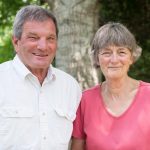 paperwork. With Steve’s leadership and the support of many devoted volunteers, the BCT has raised more than $8 million, protected more than 280 acres and has created a network of well-used and maintained trails in this beautiful corner of Cape Cod on Buzzards Bay. BCT is just one of two “small businesses” that the husband and wife operate: Ballentine’s Boat Shop has done exquisite boat building and renovations since 1974. They are a real team; each would be the first to say they could not do it without the other. They have brought the same attitudes of love and stewardship for the character of Bourne they employ in the building and restoration of quality boats.
paperwork. With Steve’s leadership and the support of many devoted volunteers, the BCT has raised more than $8 million, protected more than 280 acres and has created a network of well-used and maintained trails in this beautiful corner of Cape Cod on Buzzards Bay. BCT is just one of two “small businesses” that the husband and wife operate: Ballentine’s Boat Shop has done exquisite boat building and renovations since 1974. They are a real team; each would be the first to say they could not do it without the other. They have brought the same attitudes of love and stewardship for the character of Bourne they employ in the building and restoration of quality boats.
2019
David Doherty of Chatham has volunteered his real estate expertise for both the Town of Chatham Land Bank and the Chatham Conservation Foundation for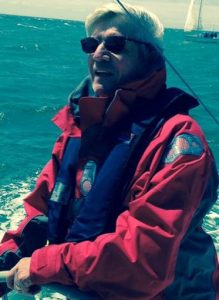 the past 25 years. Almost all of the land acquisitions that have occurred since then have had Dave’s hand in it: identifying priority parcels, reaching out to landowners, negotiating a bargain purchase price, and securing funding through Town Meeting approval or private fundraising or both. He has been described as dogged, persistent and “like a dog with a bone: until he can make it happen he never gives up.” He does his homework, knows the market and has inspired the confidence of his board members and the public at large. Dave also pioneered the use of the “undevelopment” concept in Chatham, most recently succeeding in turning the disused Merservey’s restaurant on Route 28 into a small town arboretum. He has worked cooperatively on joint CCF-Town projects, such as the highly-regarded Twinefield project in South Chatham. Where would Chatham be without Dave’s good works?
the past 25 years. Almost all of the land acquisitions that have occurred since then have had Dave’s hand in it: identifying priority parcels, reaching out to landowners, negotiating a bargain purchase price, and securing funding through Town Meeting approval or private fundraising or both. He has been described as dogged, persistent and “like a dog with a bone: until he can make it happen he never gives up.” He does his homework, knows the market and has inspired the confidence of his board members and the public at large. Dave also pioneered the use of the “undevelopment” concept in Chatham, most recently succeeding in turning the disused Merservey’s restaurant on Route 28 into a small town arboretum. He has worked cooperatively on joint CCF-Town projects, such as the highly-regarded Twinefield project in South Chatham. Where would Chatham be without Dave’s good works?
2020 – No award given during Covid-19 pandemic
2021
For 20 years Fred Gaechter has dedicated his retirement in service to Truro’s town offices, boards and committees, as well as serving in leadership roles with numerous organizations. Nowhere has his contribution been more significant and foresighted than with the Truro Conservation Trust. Due in large part to Fred’s leadership and skills the TCT has acquired significant and sizable parcels of land that protect and preserve fragile threatened wetlands and ecosystems. Those who have worked with Fred in these efforts all emphasize his ability as collaborator and negotiator, his vision and determination that ensures success. His ability to “get things done” working inside and outside town government has become legendary.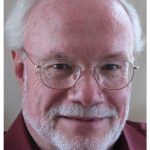
2022
Before there was a Cape Cod Land Bank or Community Preservation Act to help fund town open space purchases, there were just a handful of passionate volunteers willing to rally townspeople to pay to save the places that made their community special. Through his gentle but dogged persuasion, Robert Finch figured out how to educate Brewster voters about the “bright ring of waters”— ponds, marshes, streams and bay—encircling the town, and the need to protect it. He co-chaired the first open space committee in the 1980s, negotiated with dozens of landowners in the 800-acre backwoods Punkhorn, and secured successive Town Meeting approvals to buy it for conservation. All the while, Bob was building his career as one of “America’s leading nature essayists, expressing his love of Cape Cod and Cape Codders. Now a resident of Wellfleet, Bob has inspired new generations to pick up his mantle to name the places they love and preserve them. Photo credit: Kathy Shorr
2023
Ramona (Nosapocket) Peters is a Bear Clan member and respected elder of the Mashpee Wampanoag Tribe. She served for many years as the preservation officer for the tribal government. In 2012 she founded the Native Land Conservancy, Inc. (NLC), the first land trust east of the Mississippi governed by Native Americans. In its first decade, NLC has protected 100+ acres in E. Massachusetts and acquired three cultural respect easements, enabling safe native access for cultural practices and ceremony on town and land trust properties. With Ramona continuing as president, NLC has matured into a strong organization with its first staff and office. Ramona is a quiet, thoughtful and determined leader, making sure all voices are heard on a matter. Her worldwide experience in working with and advising indigenous people is highly respected. Ramona says, “I think land has power to generate peace. No matter what state of mind you are in, if you find yourself out in the woods or near the water, peace will come to you relatively quickly.” 